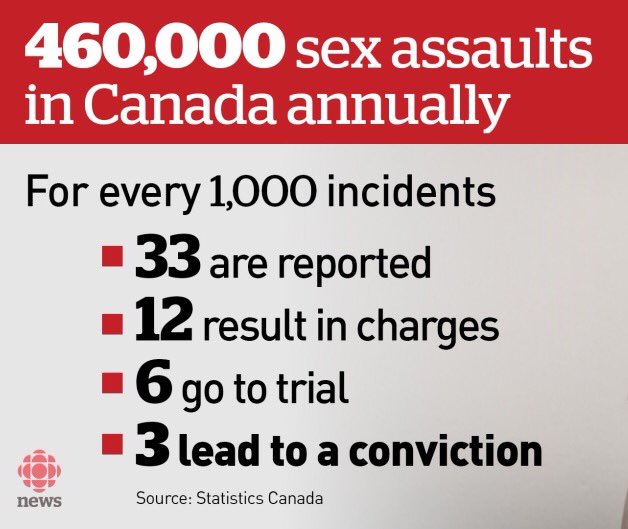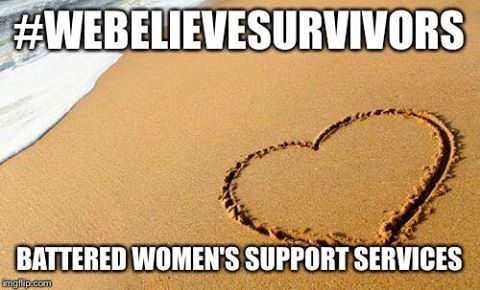The Jian Ghomeshi trial and verdict reminds us that rape culture persists in Canada. Conviction rates for sexual assaults in Canada are 0.3 % and the Ghomeshi verdict is another case that falls under this deficiency. It is no longer sufficient to have national conversations about the lack of justice for survivors of sexual assault. There need to be changes within Canada’s criminal legal system. This case like many others, reminds us that a woman’s word is not enough. The judicial system expects the “perfect victim”: angry but not too angry; have a clear memory of the incident; report to the police immediately and disclose everything even though you are fearful of the repercussions; don’t be on drugs or alcohol during the assault.
In this trial, and many sexual assault trials, when a woman victim comes forth it is usually her that has to be on stand and crossed examined intensely. The accused as in the Giomeshi trial has a choice to take the stand and be vulnerable to such an examination. He did not take the stand and did not have to have his entire life examined. Our current justice system is set up, in sexual assault cases, to put the burden of proof on the victim that the assault occurred and most often there is intense doubt of the victims’ words.

Reflecting on the verdict in the Jian Ghomeshi trial, our executive director Angela Marie MacDougall spoke with CKNW’s Jill Bennett to provide important analysis on the criminal legal system, men’s use of violence, and the difference between stranger assaults and dating violence. The interview ends with information about the recent escalation of stranger sex assaults in Vancouver.Click the image above to listen.
When the focus in the trial is on why the women contacted Ghomeshi following the assaults, we are allowing the perpetrator to disappear from the conversation. As if somehow it was consensual because they reached out to him after the violence. This is not uncommon, what is uncommon is women not contacting their abusive partner. The message is that women are responsible for violence against them and can prevent it…we should be focusing on the perpetrators of violence and why this so-called evidence would be accepted as reasonable doubt in court.
 It is estimated that 4 out of 5 women who are sexually assaulted in Canada, do not report it to the police or seek justice. We at BWSS know why there is under-reporting of sexual violence and the verdict in this trial says it clear – you are on trial, and you have to prove this happened, and you will be interrogated, questioned, cross examined, demeaned, and eventually dismissed. Incidents of sexual violence are not reported to the police for numerous reasons. When women do come forward they are frequently blamed for being assaulted, they receive bad treatment or police fail to take evidence. This results in many women feeling humiliated and unsupported or fear they will be re-victimized if they report sexual assault. Sexual violence carries a stigma and many girls and women are blamed for their assault.
It is estimated that 4 out of 5 women who are sexually assaulted in Canada, do not report it to the police or seek justice. We at BWSS know why there is under-reporting of sexual violence and the verdict in this trial says it clear – you are on trial, and you have to prove this happened, and you will be interrogated, questioned, cross examined, demeaned, and eventually dismissed. Incidents of sexual violence are not reported to the police for numerous reasons. When women do come forward they are frequently blamed for being assaulted, they receive bad treatment or police fail to take evidence. This results in many women feeling humiliated and unsupported or fear they will be re-victimized if they report sexual assault. Sexual violence carries a stigma and many girls and women are blamed for their assault.
Individuals who work in the legal system and criminal system add to a culture of shame and perpetuate myths around sexual assault. Police and judges have been reported making victim-blaming comments such as, a woman was “asking for” sexual violence based on her clothing: “avoid dressing like sluts” or she could have prevented the violence by just “keep [her] knees together”. This is unacceptable and creates a climate where girls and women do not feel comfortable seeking justice following a sexual assault. When there are low rates of reporting and even lower rates of conviction there is no justice. Women, on a daily basis, navigate in a world where sexual violence is prevalent…right now in Vancouver we have a number of serial sexual assaults occurring –one of the perpetrators, is a teenage boy. We have university officials attempting to cover up rates of sexual assaults happening on campuses, we have the Solicitor General of BC introducing the #saysomething campaign –in which the focus is on why girls and women don’t come forward when sexually assaulted. This illustrates that even our government needs to be more understanding and learn more about sexual assault. Everyday women do “say something” to women’s organizations, like BWSS. The focus needs to be on preventing the violence in the first place.
It’s a particularly bad day for women survivors of sexual violence. This verdict will impact whether women survivors come forth to the police and to the court. The three women who came forward in the Ghomeshi trial did what the police, the courts, and the system say to do and by doing so they are scrutinized by the public, media, and legal system. And in the end there was no justice.





